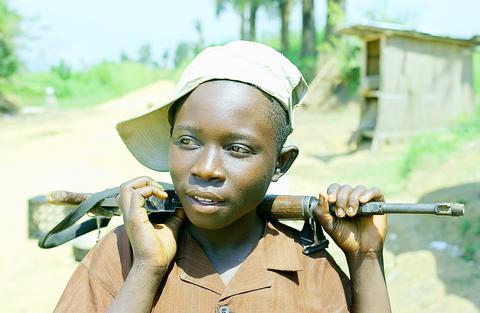A small boy of five stood on Bunia's main street gravely handing his orange plastic assault rifle to an older boy of about 15 in camouflage trousers and a fuschia pink T-shirt, a real AK-47 slung across his chest.
The older boy inspected it silently, a vacant look in his eyes, seemingly open to the idea it might work, just like his own rifle.

PHOTO: AFP
If Ituri, the most strife-torn district in eastern Democratic Republic of Congo (DRC), was once famed for the beauty of its forests and the music of its pygmies, it is now notorious for its child soldiers, many of whom are still young enough to ask strangers for sweets or biscuits.
This is in a country where child soldiers are the norm. A recent report by the UN accused 10 movements fighting in DRC of using fighters under the age of 18.
Aid workers in Ituri estimate that half of those fighting in Ituri are underage.
"It's a bit different here in Ituri in that the average age is younger and there is less forced recruitment (than elsewhere in DRC) and more voluntary recruitment. It's families and communities who send the children, the communities see it as their own protection," Johannes Webenig, the head of UNICEF for eastern DRC, told AFP in Bunia.
"You have to contribute to the war effort and there are different ways of contributing, one being to send a child to fight," he said.
The leaders of Ituri's armed groups like to play down the problem. Thomas Lubanga, the head of the Union of Congolese Patriots (UPC), the group that currently controls Bunia, claims he has "just a handful" of child soldiers and that all are orphans who are better off among his fighters than they would be out on the streets.
One of his opponents, Mathieu Ngudjolo, the leader of the Lendu Front for Patriotic Resistance in Ituri (FRPI) dismisses the problem.
Ghislain, a ragged child of 12 on the outskirts of Bunia, seemed flattered by the interest in the shots he had just fired into the air.
"Have I ever killed anyone? Yes I've killed five men already", he said proudly, brandishing, like his six fellow child soldiers, a rifle in one hand and a sharpened stick in the other.
For Ituri's boy soldiers, the line between real and make-believe is a thin one.
In the ranks of FRPI at a camp outside town, the boys have taken to dressing up. One wears a red straw hat of the style favored by the late Princess Diana. Another, not to be outdone, has made a headdress out of a baseball cap with a blue nylon tablecloth wrapped around it.
Yet others, a little older and fully aware of the fear they already inspire thanks to their weapons, have accentuated the effect by wearing wigs that give them dreadlocks flowing to the waist or a white papier-mache mask with a dehumanizing effect.

With much pomp and circumstance, Cairo is today to inaugurate the long-awaited Grand Egyptian Museum (GEM), widely presented as the crowning jewel on authorities’ efforts to overhaul the country’s vital tourism industry. With a panoramic view of the Giza pyramids plateau, the museum houses thousands of artifacts spanning more than 5,000 years of Egyptian antiquity at a whopping cost of more than US$1 billion. More than two decades in the making, the ultra-modern museum anticipates 5 million visitors annually, with never-before-seen relics on display. In the run-up to the grand opening, Egyptian media and official statements have hailed the “historic moment,” describing the

‘CHILD PORNOGRAPHY’: The doll on Shein’s Web site measure about 80cm in height, and it was holding a teddy bear in a photo published by a daily newspaper France’s anti-fraud unit on Saturday said it had reported Asian e-commerce giant Shein (希音) for selling what it described as “sex dolls with a childlike appearance.” The French Directorate General for Competition, Consumer Affairs and Fraud Control (DGCCRF) said in a statement that the “description and categorization” of the items on Shein’s Web site “make it difficult to doubt the child pornography nature of the content.” Shortly after the statement, Shein announced that the dolls in question had been withdrawn from its platform and that it had launched an internal inquiry. On its Web site, Le Parisien daily published a

China’s Shenzhou-20 crewed spacecraft has delayed its return mission to Earth after the vessel was possibly hit by tiny bits of space debris, the country’s human spaceflight agency said yesterday, an unusual situation that could disrupt the operation of the country’s space station Tiangong. An impact analysis and risk assessment are underway, the China Manned Space Agency (CMSA) said in a statement, without providing a new schedule for the return mission, which was originally set to land in northern China yesterday. The delay highlights the danger to space travel posed by increasing amounts of debris, such as discarded launch vehicles or vessel

RUBBER STAMP? The latest legislative session was the most productive in the number of bills passed, but critics attributed it to a lack of dissenting voices On their last day at work, Hong Kong’s lawmakers — the first batch chosen under Beijing’s mantra of “patriots administering Hong Kong” — posed for group pictures, celebrating a job well done after four years of opposition-free politics. However, despite their smiles, about one-third of the Legislative Council will not seek another term in next month’s election, with the self-described non-establishment figure Tik Chi-yuen (狄志遠) being among those bowing out. “It used to be that [the legislature] had the benefit of free expression... Now it is more uniform. There are multiple voices, but they are not diverse enough,” Tik said, comparing it